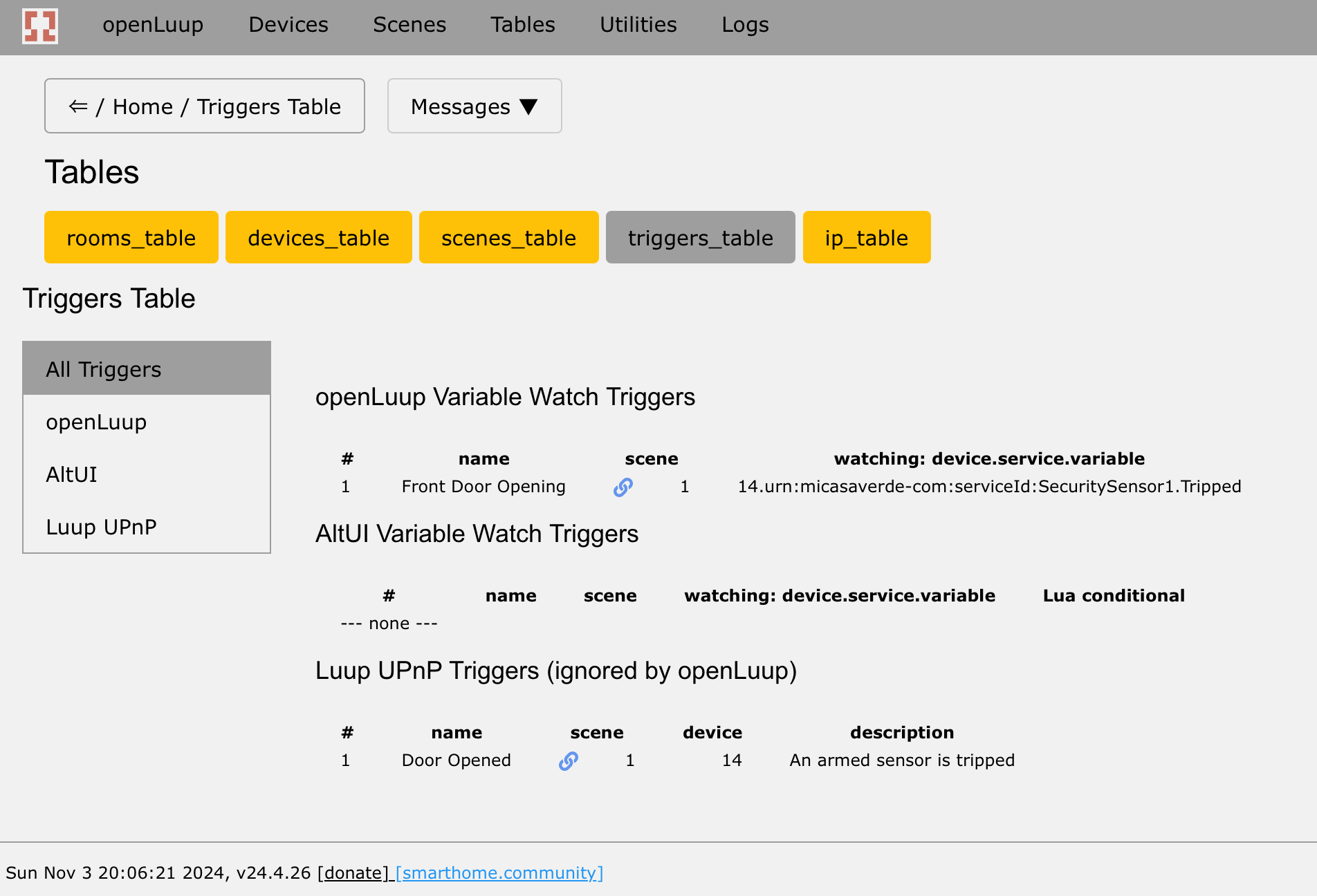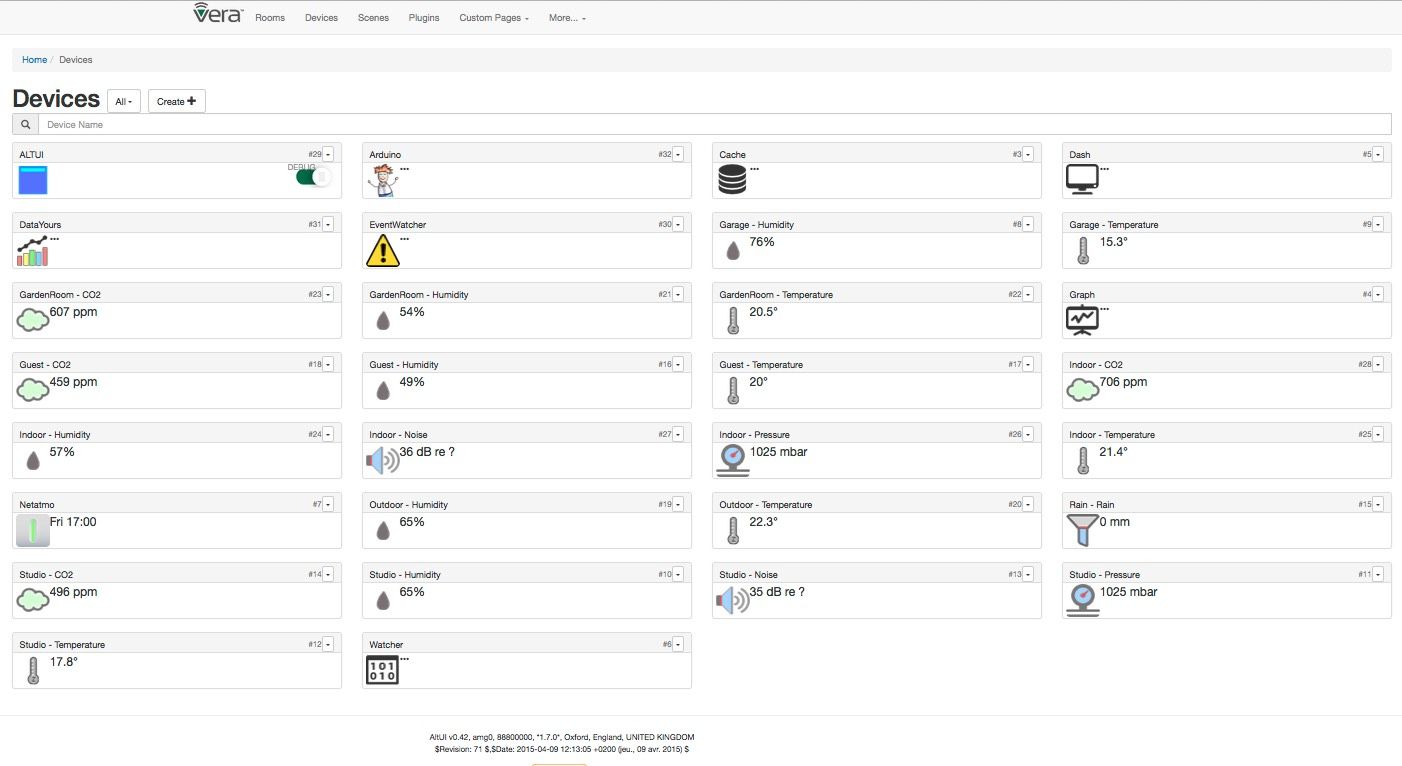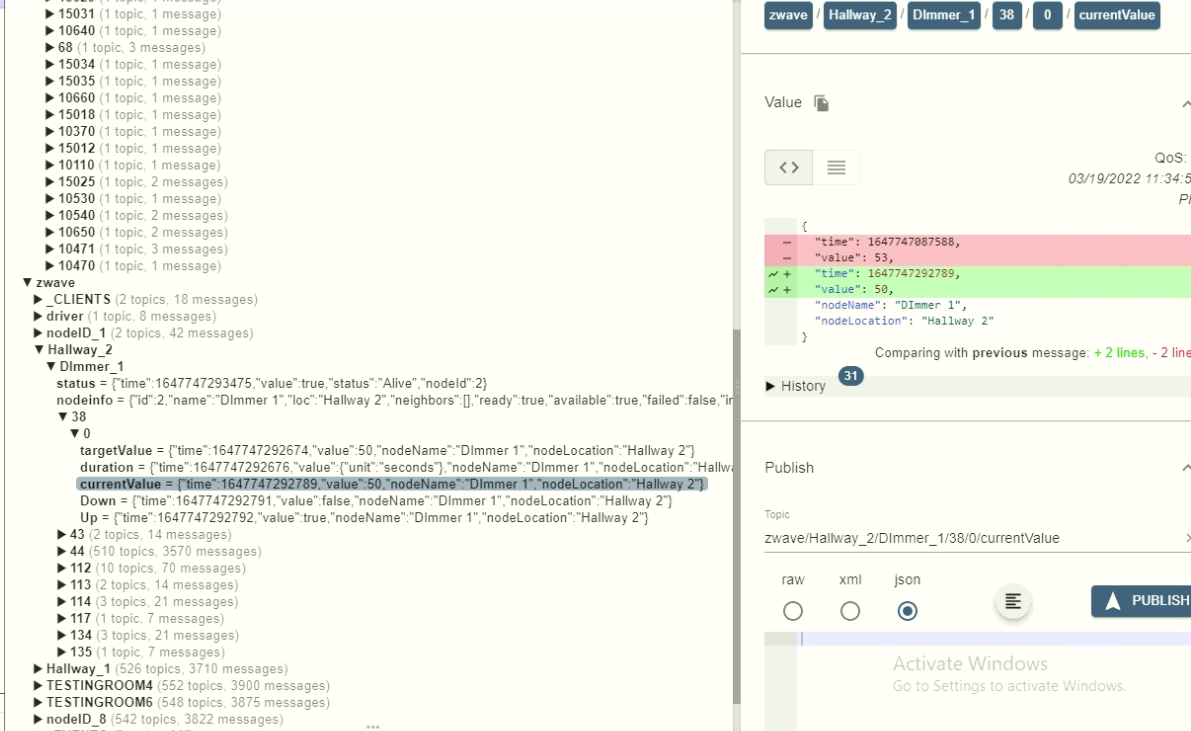call_action SendConfig
-
Interesting... I did not know that. I submitted a pull request on github though I have not tested it. Take a look.
Edit: I am able to get z-way to send a get parameter command but it doesn't appear to return the correct value. It seems to always be returning 0.
-
yeah can do something like
myValue = luup.call_action("urn:micasaverde-com:serviceId:HaDevice1","GetConfig",{parameter=6}, ID["D-Bathroom0"])
Try the updated plugin file below. I can't figure out how to make a luup.call_action return any value other than 0 but... I created 2 new functions:
-GetConfig which will get z-way to poll the parameter value from the device.
-UpdateConfig which gets the value from z-way-server to openLuup and saves it to a device variableThe way to use them is for your example
luup.call_action("urn:micasaverde-com:serviceId:HaDevice1","GetConfig",{parameter=6}, ID["D-Bathroom0"]) luup.call_action("urn:micasaverde-com:serviceId:HaDevice1","UpdateConfig",{parameter=6}, ID["D-Bathroom0"])Which will create and update a variable called Config(6) which will have the value you are looking for.
-
Interesting... I did not know that. I submitted a pull request on github though I have not tested it. Take a look.
Edit: I am able to get z-way to send a get parameter command but it doesn't appear to return the correct value. It seems to always be returning 0.
@rafale77 said in call_action SendConfig:
Interesting... I did not know that.
Yes, indeed. Standard behaviour for
luup.call_action()as documented here:http://wiki.micasaverde.com/index.php/Luup_Lua_extensions#function:_call_action
The fourth return parameter is a table of named return arguments.
-
Try the updated plugin file below. I can't figure out how to make a luup.call_action return any value other than 0 but... I created 2 new functions:
-GetConfig which will get z-way to poll the parameter value from the device.
-UpdateConfig which gets the value from z-way-server to openLuup and saves it to a device variableThe way to use them is for your example
luup.call_action("urn:micasaverde-com:serviceId:HaDevice1","GetConfig",{parameter=6}, ID["D-Bathroom0"]) luup.call_action("urn:micasaverde-com:serviceId:HaDevice1","UpdateConfig",{parameter=6}, ID["D-Bathroom0"])Which will create and update a variable called Config(6) which will have the value you are looking for.
@rafale77 said in call_action SendConfig:
Try the updated plugin file below.
A few problems here:
GetConfig()
data2 = data2: format(par)...this variable is completely undefined, and this line should cause an error.
UpdateConfig()
response = Z.zwcommand(id, inst, cc, data)this should really be a local:
local response = Z.zwcommand(id, inst, cc, data)However, I'd prefer an implementation which used the luup.call_action() return parameter. I'll provide a version a bit later.
-
Here's a skeleton for the code that you need:
GetConfig = { run = function() -- do whatever you need to get the status into ZWay_ZWaveCONFIG ZWay_ZWaveCONFIG = 42 end, extra_returns = {Config = function () return ZWay_ZWaveCONFIG end} },I'm unable to work out from your posted code exactly what you need to do to get the value you want, but just provided a dummy line which sets a global to
42.Running this from Lua Test on my machine:
local d = 23 local sid = "urn:micasaverde-com:serviceId:HaDevice1" local e,m,j,a = luup.call_action(sid, "GetConfig", {}, d) print(pretty {e,m,j,a})gives the output:
{0,"",0,{Config = 42}} -
Here's a skeleton for the code that you need:
GetConfig = { run = function() -- do whatever you need to get the status into ZWay_ZWaveCONFIG ZWay_ZWaveCONFIG = 42 end, extra_returns = {Config = function () return ZWay_ZWaveCONFIG end} },I'm unable to work out from your posted code exactly what you need to do to get the value you want, but just provided a dummy line which sets a global to
42.Running this from Lua Test on my machine:
local d = 23 local sid = "urn:micasaverde-com:serviceId:HaDevice1" local e,m,j,a = luup.call_action(sid, "GetConfig", {}, d) print(pretty {e,m,j,a})gives the output:
{0,"",0,{Config = 42}}Thank you. This is what the code should look like:
GetConfig = { run = function() local cc = 112 local par = args.parameter local data = "Get(%s)" data = data: format(par) local data2 = "data[%s].val.value" data2 = data2: format(par) local altid = luup.devices[d].id local id, inst = altid: match (NIaltid) Z.zwcommand(id, inst, cc, data) extra_returns = {Config = function () return Z.zwcommand(id, inst, cc, data) end} },Note, there might need to be a small delay between the two zwcommand executions to allow time for away to get the parameter from the device which is why I had the idea of splitting out the two actions.
Note that I also modified the zwcommand function for it to return a variable. -
That has a syntax error... you are missing an
end.Should be:
GetConfig = { run = function() local cc = 112 local par = args.parameter local data = "Get(%s)" data = data: format(par) local data2 = "data[%s].val.value" data2 = data2: format(par) local altid = luup.devices[d].id local id, inst = altid: match (NIaltid) Z.zwcommand(id, inst, cc, data) end, extra_returns = {Config = function () return Z.zwcommand(id, inst, cc, data) end} } -
another error on my part...
the extra return command should use data2
GetConfig = { run = function() local cc = 112 local par = args.parameter local data = "Get(%s)" data = data: format(par) local data2 = "data[%s].val.value" data2 = data2: format(par) local altid = luup.devices[d].id local id, inst = altid: match (NIaltid) Z.zwcommand(id, inst, cc, data) end, extra_returns = {Config = function () return Z.zwcommand(id, inst, cc, data2) end} }Edit: don't the variables need to be global to be reused in another function? Do they need to be redefined in the extra_returns function?
-
another error on my part...
the extra return command should use data2
GetConfig = { run = function() local cc = 112 local par = args.parameter local data = "Get(%s)" data = data: format(par) local data2 = "data[%s].val.value" data2 = data2: format(par) local altid = luup.devices[d].id local id, inst = altid: match (NIaltid) Z.zwcommand(id, inst, cc, data) end, extra_returns = {Config = function () return Z.zwcommand(id, inst, cc, data2) end} }Edit: don't the variables need to be global to be reused in another function? Do they need to be redefined in the extra_returns function?
@rafale77 said in call_action SendConfig:
don't the variables need to be global to be reused in another function?
Yes, that's true. It's why in my original example I used a global for the single return parameter. You could simply do that here by including the second call at the end of the main
GetConfig()function. -
obviously it is work in progress. The way I implemented it works in spite of the typos but it's not ideal. With AK's help, I think we can get something better.
@akbooer if I run the command as part of the main run command, the return is a function... not a variable as I was expecting. It is pretty strange since I get the variable if I take that return and do a luup.variable_set() with it.
-
I'm playing with the SendConfig a lot since couple of days and I can tell you that I need to put some delay between a couple of SendConfig as something it's not working all the time mixed with some "usual" zwave command!
For example, at night, I turn off a couple of zwave dimmer/switch and sending a couple of SendConfig and the SendConfig are not working 100% of the time!
Maybe zwave stack is handling on/off command differently from "SendConfig" in the queue!
-
obviously it is work in progress. The way I implemented it works in spite of the typos but it's not ideal. With AK's help, I think we can get something better.
@akbooer if I run the command as part of the main run command, the return is a function... not a variable as I was expecting. It is pretty strange since I get the variable if I take that return and do a luup.variable_set() with it.
@rafale77 said in call_action SendConfig:
I run the command as part of the main run command, the return is a function...
Ah yes. Update to the latest development branch for openLuup.
I discovered a long-standing omission in the scheduler’s return parameter processing. It should now evaluate those parameters which are functions.
-
@rafale77 said in call_action SendConfig:
I run the command as part of the main run command, the return is a function...
Ah yes. Update to the latest development branch for openLuup.
I discovered a long-standing omission in the scheduler’s return parameter processing. It should now evaluate those parameters which are functions.
@akbooer
Awesome. I thought I was missing something again.
Is it still strongly recommended not to use luup.sleep with openLuup? I put a 1 sec one in there just to improve reliability.Try the file below. You know what to do... You get the value from the luup call action just as AK is describing above and you do need to update openLuup to the latest dev version.
The reliability of the command, I think is a timing issue and the get will be worse because it needs to get a response from the device to get the up to date value. Otherwise it will just report the previous value. Not a problem if you did not update it but I think that your purpose is to toggle these configs quite a bit.
-
@akbooer
Awesome. I thought I was missing something again.
Is it still strongly recommended not to use luup.sleep with openLuup? I put a 1 sec one in there just to improve reliability.Try the file below. You know what to do... You get the value from the luup call action just as AK is describing above and you do need to update openLuup to the latest dev version.
The reliability of the command, I think is a timing issue and the get will be worse because it needs to get a response from the device to get the up to date value. Otherwise it will just report the previous value. Not a problem if you did not update it but I think that your purpose is to toggle these configs quite a bit.
-
The delay is from the zwave mesh...
We are sending a command to have z-way poll a value from the device... this may take some time.
The second command then polls the returned value from the z-way API. If we poll the API value before the network device had time to provide the updated value... then you get the old one.
It normally is not a problem with a slow engine like the vera for example but openLuup is so much faster... kind of the same problem I had with the countdown timer plugin where openLuup updates a flag so fast, turning it on and off before the variable could notice that it ever changed and would therefore never trigger anything. -
Ah, OK, then it's perhaps the best we can do.
It's possible to make the action call run asynchronously, possibly multiple times, checking for changes, or just delaying without blocking. But in this case, the luup.call_action() return can't give you the new value (because the code hasn't yet run before the call returns.)
-
@akbooer
Awesome. I thought I was missing something again.
Is it still strongly recommended not to use luup.sleep with openLuup? I put a 1 sec one in there just to improve reliability.Try the file below. You know what to do... You get the value from the luup call action just as AK is describing above and you do need to update openLuup to the latest dev version.
The reliability of the command, I think is a timing issue and the get will be worse because it needs to get a response from the device to get the up to date value. Otherwise it will just report the previous value. Not a problem if you did not update it but I think that your purpose is to toggle these configs quite a bit.
@rafale77 said in call_action SendConfig:
Not a problem if you did not update it but I think that your purpose is to toggle these configs quite a bit.
What I'm doing, with the new red series dimmers from Inovelli, I can toggle the LED "strip" on each dimmer as a notification and you can "ack" the notification on the dimmer with a 3rd button...
So right now, I'm updating all the LED strip based on some event around the house, so you can "know" something just based on the color and the effect (slide, solid, slow flash, etc...")



